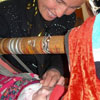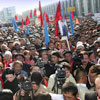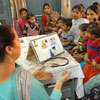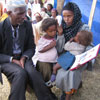World AIDS Day Statement
This year’s World AIDS Day comes at an exciting time for HIV prevention and treatment. Thirty years after the first case was reported, new science has now shown that treating people with HIV medication (anti-retrovirals) can substantially reduce the risk of transmission while smarter investments in prevention strategies have opened up a debate on the prospect of ending AIDS.
 Teams at the School are working hard in the fight against HIV/AIDS in a range of ways. For example, major funding was recently awarded for the PopART project in Africa, which will test the impact of a combination of house-to-house voluntary testing for HIV, male circumcision and offer of immediate initiation of antiretroviral therapy (ART) for all those testing HIV-positive.
Teams at the School are working hard in the fight against HIV/AIDS in a range of ways. For example, major funding was recently awarded for the PopART project in Africa, which will test the impact of a combination of house-to-house voluntary testing for HIV, male circumcision and offer of immediate initiation of antiretroviral therapy (ART) for all those testing HIV-positive.
But as the researchers behind the recently-published Good Health at Low Cost – 25 years onpoint out, a crucial weapon against the disease is a functioning health system to ensure those in need receive treatment and are regularly monitored. The LSHTM project (funded by the Rockefeller Foundation) holds some clues to help policy-makers in low and middle income countries build stronger health systems – useful at a time when countries around the world contemplate how to tackle their HIV/AIDS epidemics.
One of the editors, Dr Dina Balabanova, said: “Health systems represent the cornerstone in achieving universal access targets for HIV treatment and prevention. The lessons in our book go some way in helping policy-makers understand the key pillars required in transforming health systems and with it health care.”
The School’s Director, AIDS expert Professor Peter Piot, has meanwhile contributed to a special feature for the Daily Telegraph: World AIDS Day 2011: what we now know

![124-69-[Bangladesh]](http://blogs.lshtm.ac.uk/ghlc/files/2011/10/124-69-Bangladesh.jpg)

![1-42-[Bangladesh]](http://blogs.lshtm.ac.uk/ghlc/files/2011/10/1-42-Bangladesh.jpg)

![Front-Cover-[Thailand]](http://blogs.lshtm.ac.uk/ghlc/files/2011/10/Front-Cover-Thailand.jpg)
![Front-Cover-[Girl-Reading]](http://blogs.lshtm.ac.uk/ghlc/files/2011/10/Front-Cover-Girl-Reading.jpg)



![Back-Cover-[Thailand]](http://blogs.lshtm.ac.uk/ghlc/files/2011/10/Back-Cover-Thailand.jpg)
![Back-Cover-[Tamil-Nadu]](http://blogs.lshtm.ac.uk/ghlc/files/2011/10/Back-Cover-Tamil-Nadu.jpg)
![Back-Cover-[Ethiopia]](http://blogs.lshtm.ac.uk/ghlc/files/2011/10/Back-Cover-Ethiopia.jpg)